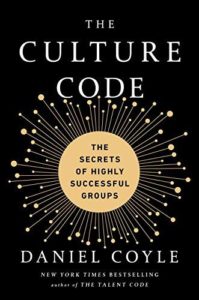AuthorConnect Chat: Dan Coyle Discusses Culture with BookPal
Posted by Megan Habel on Jan 31, 2019
Dan Coyle discusses three key behaviors that make up great company culture.
Think about the best culture you’ve been a part of. What’s that feeling worth?
A Harvard Business School study took 200 sets of matching companies—one had a strong culture and one didn’t. They tracked net revenue over 11 years, and when analyzing performance, culture was worth 756% of the net revenue. This number exemplifies the whole concept of culture.
We sat down with Daniel Coyle, bestselling author of The Culture Code, to talk company culture. As Dan puts it, "Culture is when people add up to more than the sum of their parts."
Every day, your group goes up and down, in terms of culture. What if you could control this?
Coyle studied the science of performance for the last couple of decades. He studied high-performing groups such as Pixar, Navy SEALs, and the San Antonio Spurs, to see what they are doing right. What he found was that culture is all about behaviors. Communicating, leading, and creating group behavior are the three key behaviors that make up great culture.
1. Build safety (stay connected)
Habit: Zero tolerance for brilliant jerks. Coyle gives the example of Peter Skillman's spaghetti tower challenge. When faced with building the tallest tower out of just uncooked spaghetti, tape, and string, an unlikely winner arose - kindergarteners. Coyle explains, "Our mental model of group performance is wrong. It leaves out two of the most important factors: status management and safety."
Ideas for action:
• Obey the 34x rule—people are 34x more likely to say yes if you ask in person. Prioritize face-to-face communication.
• Send the two-line email. Ask: "Could you tell me one thing you want me to keep doing and one thing you want me to stop doing?" It's very simple, but it sends a powerful message of connection and safety.
• Use the Open Face. Smart communicators are constantly sending signals with their facial expressions.
2. Sharing vulnerability (share information)
Habit: Admit weakness. Share information they don't expect you to share. According to Coyle, the four most important words a leader can say are: "I screwed that up". This creates a vulnerability loop; when one person takes a risk, the other person takes a risk back, and so on. When people do that, closeness and cooperation increases. You can then create group habits, where people tell the truth.
Ideas for action:
• Use AARs (after action reviews): what went right, what went wrong, what can we do differently next time.
• Aim for warm candor; avoid brutal honesty. When you’re brutally honest, you create a culture of brutality.
• When listening, use the magic phrase: “tell me more.”
3. Establish purpose (determine direction)
Habit: Use corny mantras. When there is a crisis, culture is challenged. Nothing can illustrate this more than Johnson & Johnson and the Tylenol poisoning scare in 1982. They were faced with a question: what comes first? It came back to the company credo: "We believe our first responsibility is to [all] who use our products and services". With this mantra in mind, they don't have to think when another crisis comes around, their priorities are laid out. Purpose statements are used like a GPS or compass—they tell you how to react to whatever situation comes up.
Ideas for action:
• Obey the 10x rule. You need to express your purpose 10x more clearly than you think.
• Continually seek and share impactful stories. Smart cultures are purposeful about digging up, harvesting and sharing impactful stories about their benefit.
• Have regular CSWD (Cool Stuff We Do) meetings. Have a regular gathering about exciting things happening in the company—fill your windshield with clear signals of your mantra.
Be sure to listen in to the full AuthorConnect Chat below, and purchase copies of The Culture Code: The Secrets of Highly Successful Groups for your team to transform your culture.
Watch the full chat here:
This post was written by Megan Habel, the Brand Strategist at BookPal. She is currently reading Educated by Tara Westover.



